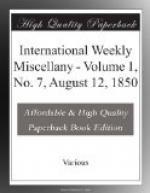* * * * *
THE OHIO HISTORICAL SOCIETY has published several interesting volumes, of which the most important are those of Judge Burnett. An address, by William D. Gallagher, its President, on the History and Resources of the West and Northwest, has just been issued: and it has nearly ready for publication a volume of Mr. Hildreth.
* * * * *
THE IMPERIAL LIBRARY AT VIENNA has been enriched by a very old Greek manuscript on the Advent of Christ, composed by a bishop of the second century, named Clement. This manuscript was discovered a short time since by M. Waldeck, the philologist, at Constantinople.
* * * * *
MR. KEIGHTLEY’s “History of Greece” has been translated into modern Greek and published at Athens.
* * * * *
GUIZOT’s book on Democracy, has been prohibited in Austria, through General Haynau’s influence.
* * * * *
WORDSWORTH’S POSTHUMOUS POEM, “The Prelude,” is in the press of the Appletons, by whose courtesy we are enabled to present the readers of The International with the fourth canto of it, before its publication in England. The poem is a sort of autobiography in blank verse, marked by all the characteristics of the poet—his original vein of thought; his majestic, but sometimes diffuse, style of speculation; his large sympathies with humanity, from its proudest to its humblest forms. It will be read with great avidity by his admirers—and there are few at this day who do not belong to that class—as affording them a deeper insight into the mind of Wordsworth than any of his other works. It is divided into several books, named from the different situations or stages of the author’s life, or the subjects which at any period particularly engaged his attention. We believe it will be more generally read than any poem of equal length that has issued from the press in this age.
* * * * *
Miss COOPER’s “RURAL HOURS"[1] is everywhere commended as one of the most charming pictures that have ever appeared of country life. The books of the Howitts, delineating the same class of subjects in England and Germany, are not to be compared to Miss Cooper’s for delicate painting or grace and correctness of diction. The Evening Post observes:
“This is one of the most delightful books we have lately taken up. It is a journal of daily observations made by an intelligent and highly educated lady, residing in a most beautiful part of the country, commencing with the spring of 1848, and closing with the end of the winter of 1849. They almost wholly concern the occupations and objects of country life, and it is almost enough to make one in love with such a life to read its history so charmingly narrated. Every day has its little record in this volume,—the




